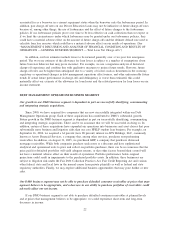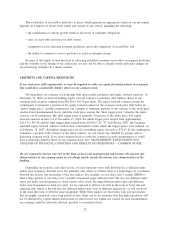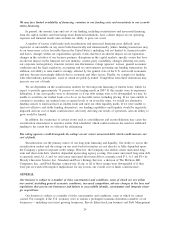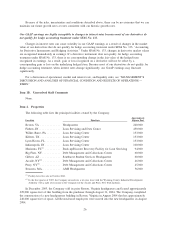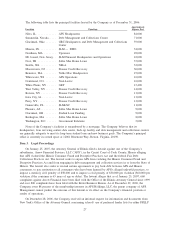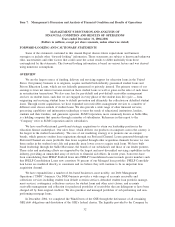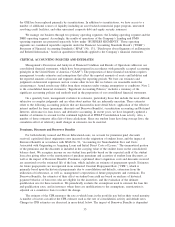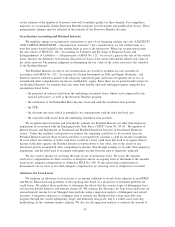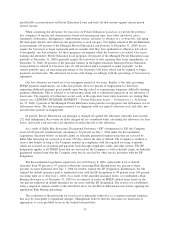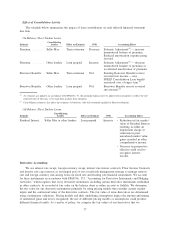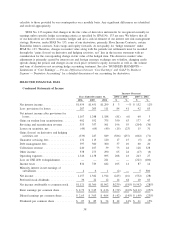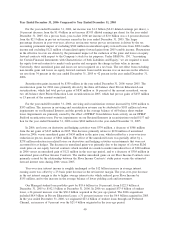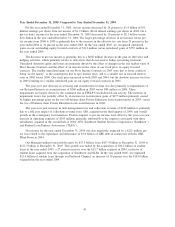Sallie Mae 2006 Annual Report Download - page 33
Download and view the complete annual report
Please find page 33 of the 2006 Sallie Mae annual report below. You can navigate through the pages in the report by either clicking on the pages listed below, or by using the keyword search tool below to find specific information within the annual report.Item 7. Management’s Discussion and Analysis of Financial Condition and Results of Operations
MANAGEMENT’S DISCUSSION AND ANALYSIS OF
FINANCIAL CONDITION AND RESULTS OF OPERATIONS
Years ended December 31, 2004-2006
(Dollars in millions, except per share amounts, unless otherwise stated)
FORWARD-LOOKING AND CAUTIONARY STATEMENTS
Some of the statements contained in this Annual Report discuss future expectations and business
strategies or include other “forward-looking” information. Those statements are subject to known and unknown
risks, uncertainties and other factors that could cause the actual results to differ materially from those
contemplated by the statements. The forward-looking information is based on various factors and was derived
using numerous assumptions.
OVERVIEW
We are the largest source of funding, delivery and servicing support for education loans in the United
States. Our primary business is to originate, acquire and hold both federally guaranteed student loans and
Private Education Loans, which are not federally guaranteed or privately insured. The primary source of our
earnings is from net interest income earned on those student loans as well as gains on the sales of such loans
in securitization transactions. We also earn fees for pre-default and post-default receivables management
services on student loans, such that we are engaged in every phase of the student loan life cycle — from
originating and servicing student loans to default prevention and ultimately the collection on defaulted student
loans. Through recent acquisitions, we have expanded our receivables management services to a number of
different asset classes outside of student loans. We also provide a wide range of other financial services,
processing capabilities and information technology to meet the needs of educational institutions, lenders,
students and their families, and guarantee agencies. SLM Corporation, more commonly known as Sallie Mae,
is a holding company that operates through a number of subsidiaries. References in this report to the
“Company” refer to SLM Corporation and its subsidiaries.
We have used both internal growth and strategic acquisitions to attain our leadership position in the
education finance marketplace. Our sales force, which delivers our products on campuses across the country, is
the largest in the student loan industry. The core of our marketing strategy is to promote our on-campus
brands, which generate student loan originations through our Preferred Channel. Loans generated through our
Preferred Channel are more profitable than loans acquired through other acquisition channels because we own
them earlier in the student loan’s life and generally incur lower costs to acquire such loans. We have built
brand leadership through the Sallie Mae name, the brands of our subsidiaries and those of our lender partners.
These sales and marketing efforts are supported by the largest and most diversified servicing capabilities in the
industry, providing an unmatched array of services to financial aid offices. In recent years, borrowers have
been consolidating their FFELP Stafford loans into FFELP Consolidation Loans in much greater numbers such
that FFELP Consolidation Loans now constitute 56 percent of our Managed loan portfolio. FFELP Consolida-
tion Loans are marketed directly to consumers and we believe they will continue to be an important loan
acquisition channel.
We have expanded into a number of fee-based businesses, most notably, our Debt Management
Operations (“DMO”) business. Our DMO business provides a wide range of accounts receivable and
collections services including student loan default aversion services, defaulted student loan portfolio manage-
ment services, contingency collections services for student loans and other asset classes, and accounts
receivable management and collection for purchased portfolios of receivables that are delinquent or have been
charged off by their original creditors. We also purchase and managed portfolios of sub-performing and non-
performing mortgage loans.
In December 2004, we completed the Wind-Down of the GSE through the defeasance of all remaining
GSE debt obligations and dissolution of the GSE’s federal charter. The liquidity provided to the Company by
32


